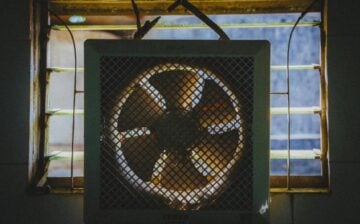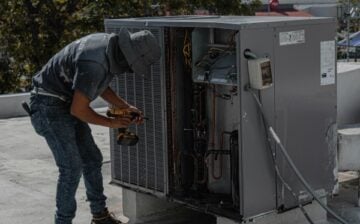Managing energy bills is a priority for many homeowners, especially when using heating and air conditioning systems. However, there are several misconceptions about how to keep energy costs low. These misunderstandings can lead to practices that may not only fail to save money but could actually increase energy usage.

#Setting the Thermostat Higher or Lower, Heat or Cool a Home Faster
One of the most prevalent myths is that cranking up the thermostat to a higher temperature in winter or lowering it drastically in summer will heat or cool your home faster. In reality, HVAC systems work at a consistent rate. Setting the thermostat to an extreme temperature doesn’t accelerate the process; it just causes the system to run longer, which increases energy consumption. The best approach is to set the thermostat to your desired temperature and let the system work efficiently.
#Leaving the HVAC System On All Day Is More Efficient
Some people believe that keeping the heating or cooling system running at a constant temperature all day, even when the house is empty, is more efficient than turning it off and on. The idea is that the system won’t have to work as hard to bring the home back to a comfortable temperature. However, this is a misconception. It’s more energy-efficient to turn the system off or use a programmable thermostat to reduce energy use when the house is empty. The energy savings from not running the system during unoccupied times outweigh the energy used to bring the temperature back to a comfortable level.
#Closing Vents in Unused Rooms Saves Energy
Another common misconception is that closing vents in rooms that aren’t being used will save energy. The thought process is that if the air isn’t being delivered to certain rooms, the system will use less energy. However, HVAC systems are designed to heat or cool a specific amount of space. Closing vents can disrupt the balance of the system, causing it to work harder and use more energy. Additionally, this practice can lead to increased pressure in the ductwork, potentially causing leaks and reducing the system’s overall efficiency.
#Ceiling Fans Cool the Room
Ceiling fans are often misunderstood in their function. Many people believe that ceiling fans cool rooms, and as a result, they leave them running even when a room is unoccupied. In truth, ceiling fans don’t lower the temperature of a room; they create airflow that makes the room feel cooler by helping to evaporate sweat from the skin. This means ceiling fans should be turned off when a room is empty to avoid unnecessary energy use.
#Bigger HVAC Systems Are Better
There’s a belief that a larger HVAC system will be more effective at heating and cooling a home, which will save on energy costs. However, an oversized system can actually be less efficient. HVAC systems that are too large for a home will cycle on and off more frequently, which not only wastes energy but also leads to uneven temperatures, higher humidity levels, and increased wear and tear on the system. It’s essential to have a system that is appropriately sized for your home to ensure optimal efficiency and comfort.
#Energy Efficiency Upgrades Aren’t Worth the Cost
Many homeowners shy away from energy efficiency upgrades due to the upfront cost, believing that the savings won’t justify the expense. While it’s true that some upgrades can be expensive, the long-term savings in energy costs can be significant. For instance, upgrading to a high-efficiency HVAC system, adding insulation, or installing energy-efficient windows can lead to substantial reductions in energy consumption. Additionally, many of these upgrades come with rebates or tax incentives that can offset the initial cost.
#Turning Off the HVAC System When You Leave for Short Periods Saves Energy
Another myth is that turning off the HVAC system when leaving the house for short periods will save energy. While it might seem logical, this practice can actually lead to increased energy usage. When you return and turn the system back on, it has to work harder to bring the temperature back to a comfortable level, which can negate any savings from turning it off. A better approach is to use a programmable thermostat to set the temperature slightly higher in the summer or lower in the winter during short absences.
#Insulation Only Matters in Cold Weather
Insulation is often associated with keeping a home warm in the winter, but it’s just as important in the summer. Proper insulation helps maintain a consistent indoor temperature by keeping the heat out in the summer and the cold out in the winter. Without adequate insulation, your HVAC system has to work harder to maintain a comfortable temperature, leading to higher energy bills. Ensuring your home is well-insulated year-round can lead to significant energy savings.
#Using Space Heaters Saves Money
Some people believe that using space heaters to warm specific areas of the home is more cost-effective than running the central heating system. While space heaters can be useful for heating small, occupied spaces, they are generally not more energy-efficient. Most space heaters run on electricity, which is more expensive than gas or oil used by central heating systems. Additionally, space heaters only warm a small area, so the central system still needs to maintain the temperature in the rest of the house.
#Regular Maintenance Isn’t Necessary
HVAC systems are often out of sight, out of mind, leading to the misconception that they don’t require regular maintenance. However, neglecting routine maintenance from Leith Heating and Cooling can lead to a decline in system efficiency, higher energy bills, and even system failures. Regularly changing filters, cleaning ducts, and scheduling annual professional check-ups are crucial for keeping the system running efficiently and extending its lifespan. Proper maintenance ensures that the system operates at peak efficiency, reducing energy consumption and lowering bills.
We hope you found this blog post on 10 Common Misconceptions About Keeping A Low Energy Bill When Using Heat & Air Conditioning, useful. Be sure to check out our post on Affordable Ways To Save on Energy Bills for more great tips!
Have Experience in the Moving Industry? Want an Additional Income Stream? Work With All Around Moving!
Partner with us and we’ll help you make money. If you want to apply your expertise in the moving industry, team up with us and we’ll help you make money. Click here to learn more.





